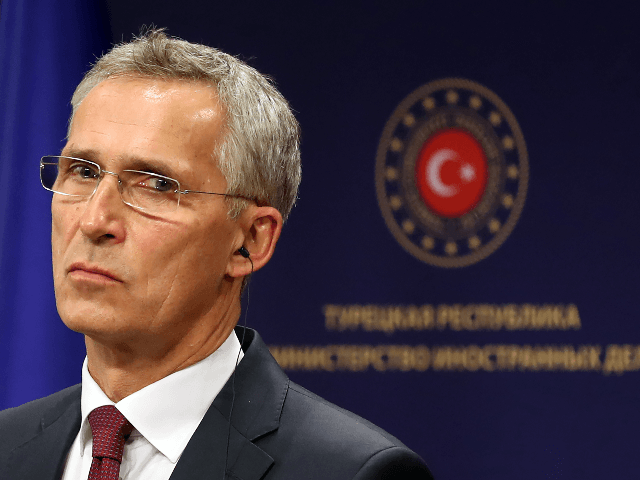NATO Secretary-General Jens Stoltenberg insisted during a press conference Thursday that the military alliance is not playing and will not play a role in the ongoing conflict in Nagorno-Karabakh, a conflict NATO ally Turkey has reportedly flooded with imported Syrian mercenaries.
Nagorno-Karabakh is a disputed region of Azerbaijan that borders Armenia and whose population is majority Armenia. Azerbaijan has no practical control over the region; it is run by a separatist Armenian government that calls itself the “Republic of Artsakh.” Armenia does not recognize Artsakh as a country.
Fighting between Artsakh forces and the Azeri military broke out in late September; both sides claim the other shot first. The conflict has escalated, now involving former Armenian troops. As the Azeri people are Turkic, Baku enjoys support from Islamist Turkish President Recep Tayyip Erdogan. State actors and human rights groups have accused Turkey of shipping allied jihadist fighters from Syria into Nagorno-Karabakh as it did in Libya to fight the ethnic Armenians or the region.
This week, photos began circulating online of Azeri soldiers beheading an Armenian soldier and carrying his head like a trophy. The photos reportedly surfaced on the dead soldier’s social media account, which the Azeris allegedly used his phone to log into after killing him.
Turkey is a member of NATO which gives it the power to invoke the North Atlantic Treaty’s Article 5. Under Article 5, an attack on one member state is an attack on all and all must mobilize for war if one requests it. It has only been invoked once to attack the Taliban in Afghanistan following the September 11, 2001, jihadist attacks. As Nagorno-Karabakh is not part of Turkey, it is unlikely that any military damage Turkey may sustain there would form a legitimate argument to involve all NATO states there.
Armenia is treaty-bound militarily to Russia through the Collective Security Treaty Organization (CSTO), a group of post-Soviet states who joined an alliance mirroring NATO’s following the collapse of the Soviet Union. Russia is largely considered to lead the CSTO.
Despite Armenia’s status as a non-NATO member, Stoltenberg met with the nation’s president, Armen Sarkissian, on Tuesday to discuss the conflict on its border. On that occasion, Stoltenberg called Armenia a “valued partner for NATO” but insisted the alliance would not enter the Nagorno-Karabakh conflict.
“I reminded the [Armenian] president that NATO is not part of this conflict. Both Armenia and Azerbaijan have been valued NATO partners for more than 25 years,” Stoltenberg said.
On Thursday, answering questions from reporters directly, Stoltenberg repeated that commitment to stay out.
“Both Armenia and Azerbaijan are partners, valued partners of NATO. And when the president of a partner nation comes to Brussels and asks for a meeting, then it’s natural to meet that president,” the secretary-general said, explaining Sarkissian’s visit.
Stoltenberg said he would also meet with Sarkissian’s counterpart, President Ilham Aliyev, if he requested it.
“NATO is not part of the conflict in and around Nagorno-Karabakh,” he then repeated. “Turkey is a valued Ally and I also stated that clearly to the President of Armenia. We are deeply concerned about the conflict in and around Nagorno-Karabakh, especially the targeting of civilians. We have seen several examples of that.”
“There has to be a political solution to the conflict. … [W]e think it’s important to now find a political solution and we strongly support those efforts. But again, NATO’s not part of the conflict and I stated that very clearly to the Armenian President when I met him yesterday,” Stoltenberg said.
Answering a separate question, Stoltenberg added, “Turkey is a valued Ally, but I also expect Turkey to use its considerable influence in the region to calm tensions.”
The secretary-general’s comments followed a threat from Turkish Vice President Fuat Oktay on Wednesday to invade Artsakh with Turkish troops. Speaking to CCN Türk, Oktay said Turkey “will not hesitate to send troops and provide military support to Azerbaijan,” according to the pro-Erdogan newspaper Sabah.
“Our president [Recep Tayyip Erdogan] has made that clear from the outset,” Oktay said. “Azerbaijan and Turkey have agreements on military cooperation. If Armenia takes unexpected steps and there is a request from Baku to send troops Turkey will not hesitate.”
The foreign ministers of both Armenia and Azerbaijan are scheduled to hold talks in Washington on Friday alongside Secretary of State Mike Pompeo in an attempt to work towards a ceasefire. Senior State Department officials have also been involved in scheduling talks and mediating between the two states.
Last week, Democrat Party presidential candidate condemned President Donald Trump for not turning America into a primary actor in Nagorno-Karabakh.
“Inexplicably, the Trump Administration has been largely passive, and disengaged, throughout this recent period of escalation,” Biden said. “Since the outbreak of hostilities on September 27, neither President Trump nor Secretary of State [Mike] Pompeo has placed a single phone call to the leaders of Armenia and Azerbaijan, even as the region goes up in flames.”
The United States, he added “must get more involved.”
Neither Armenia nor Azerbaijan have requested American military involvement in the conflict.
“We are talking about this; we are talking with Armenia. We have very good relations with Armenia. Very nice people live there. They are so dedicated, very purposeful, incredible people. We’ll see what happens,” Trump told reporters regarding Friday’s talks.

COMMENTS
Please let us know if you're having issues with commenting.